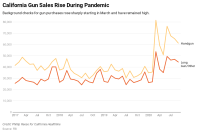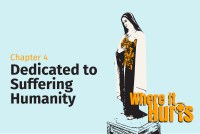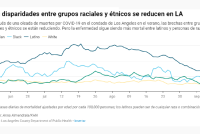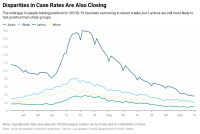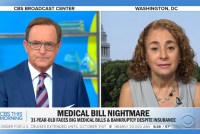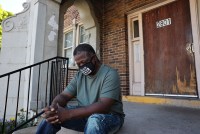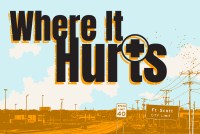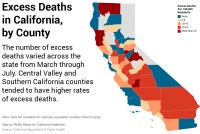Latest Morning Briefing Stories
As Anxieties Rise, Californians Buy Hundreds of Thousands More Guns
Gun sales are surging in California, where handgun-related FBI background checks this spring and summer were up 83% over 2019. Whether pro or con on gun control, experts agree the trend has been fueled by pandemic-related unrest.
‘No Mercy’ Chapter 5: With Rural Hospital Gone, Cancer Care Means a Daylong Trek
The hunt for good cancer treatment often means miles on the road, time spent waiting and exhaustion from treatment and transit. “The further you have to travel to get care, the less likely that you are going to take that effort to do that,” said Boban Mathew, an oncologist in southeastern Kansas.
KHN’s ‘What the Health?’: A Little Good News and Some Bad on COVID-19
Glimmers of hope are beginning to appear in the fight against the coronavirus, such as a decreasing death rate. But there’s not-so-good news, too, including a push for “herd immunity,” which could result in millions more deaths. Meanwhile, the Trump administration doubles down on work requirements for Medicaid. Margot Sanger-Katz of The New York Times, Paige Winfield Cunningham of The Washington Post and Alice Miranda Ollstein of Politico join KHN’s Julie Rovner to discuss these issues and more. Plus, for extra credit, the panelists recommend their favorite health policy stories of the week they think you should read, too.
‘No Mercy’ Chapter 4: So, 2 Nuns Step Off a Train in Kansas … A Hospital’s Origin Story
Mercy Hospital and the people of Fort Scott, Kansas, have a long, tangled history. To understand what the town lost when the hospital shut its doors, we rewind the story to 1886.
‘An Arm and a Leg’: Vetting TikTok Mom’s Advice for Dealing With Debt Collectors
We first learned about Shaunna Burns when her tips on medical bills went viral. In part two of our conversation with the so-called TikTok mom, we’re back for guidance about dealing with debt collectors. Then we fact-checked her advice with a legal expert, who said: Most of Burns’ advice totally checks out.
KHN’s ‘What the Health?’: Democrats May Lose on SCOTUS, But Hope to Win on ACA
Barring something unexpected, Democrats in the Senate appear to lack the votes to block the confirmation of Judge Amy Coney Barrett to the Supreme Court. So, instead they used the high-profile confirmation hearings to hammer on Republicans for again putting the Affordable Care Act in peril. Mary Ellen McIntire of CQ Roll Call, Shefali Luthra of The 19th and Sarah Karlin-Smith of Pink Sheet join KHN’s Julie Rovner to discuss these issues and more. Plus, Rovner interviews Dr. Ashish Jha, dean of the Brown University School of Public Health, about public health challenges in dealing with COVID-19.
COVID en LA: prevención en los trabajos ha salvado vidas de latinos, dicen oficiales
La agresiva aplicación de las normas de salud y la apertura de líneas para denunciar si no se cumplen han contribuido a la disminución de muertes.
COVID Crackdowns at Work Have Saved Black and Latino Lives, LA Officials Say
Strict enforcement of coronavirus protocols at factories and shops where some of the worst outbreaks have occurred has reduced the racial and ethnic disparities in COVID deaths and illness, say public health officials. They want to expand the effort by creating workplace safety councils.
‘No Mercy’ Chapter 3: Patchwork of Urgent Care Frays After a Rural Hospital Closes
Fort Scott, Kansas, went without an ER for 18 days, after the local hospital shut down. Documenting local trauma during that “dark period” helped investigative reporter Sarah Jane Tribble unravel some of the complications that come after a rural hospital closes.
KHN’s ‘What the Health?’: Trump vs. COVID
President Donald Trump is one of at least two dozen people tied to the White House who have tested positive for COVID-19. Negotiations on the next round of COVID relief are off again — maybe. And the FDA and CDC continue to fight for scientific credibility. Alice Miranda Ollstein of Politico, Kimberly Leonard of Business Insider and Erin Mershon of Stat News join KHN’s Julie Rovner to discuss these issues and more. Plus, Rovner interviews Amy Howe of SCOTUSblog about what the Supreme Court might do with the latest case challenging the constitutionality of the Affordable Care Act.
‘No Mercy’ Chapter 2: Unimaginable, After a Century, That Their Hospital Would Close
After Mercy Hospital Fort Scott shut its doors, investigative reporter Sarah Jane Tribble traveled to Kansas and spent time with former hospital president Reta Baker and City Manager Dave Martin — to understand what their town lost.
‘An Arm and a Leg’: TikTok Mom Takes On Medical Bills
Shaunna Burns went viral on TikTok, partly because of a series of videos dishing out real-talk advice on fighting outrageous medical bills.
Watch: Young Man Faces Medical Bankruptcy — Even With Insurance
“CBS This Morning” tells the story of Matthew Fentress, a young man who has had serious heart disease for six years. It’s the latest story in the ongoing crowdsourced Bill of the Month investigation.
Evictions Damage Public Health. The CDC Aims to Curb Them ― For Now.
A survey of 17 cities found more than 50,000 pandemic-related eviction filings. Housing advocates worry that increased housing instability will lead to more COVID-19 and other illnesses.
KHN’s ‘What the Health?’: Election Preview: What’s Next for Health?
How will health issues affect voter choices? What will happen if President Donald Trump is reelected or the White House goes to Joe Biden? In this special election preview episode, Margot Sanger-Katz of The New York Times, Joanne Kenen of Politico and Rebecca Adams of CQ Roll Call join KHN’s Julie Rovner to discuss these issues and more.
‘No Mercy’ Explores the Fallout After a Small Town Loses Its Hospital
Listen to “Where It Hurts,” each episode debuting on Tuesdays, from Sept. 29 through Nov. 10. When Mercy Hospital Fort Scott shut its doors, locals lost care. Health workers lost jobs. The hole left behind is bigger than a hospital. Season One is “No Mercy.”
Heartbreaking Bills, Lawsuit and Bankruptcy — Even With Insurance
With health insurance that can leave him on the hook for more than a quarter of his salary every year, a Kentucky essential worker who has heart disease is one of millions of Americans who are functionally uninsured. At only 31, he has already been through bankruptcy and being sued by his hospital. This year, he faced a bill for more than $10,000.
KHN’s ‘What the Health?’: ACA in Peril With Ginsburg’s Seat in Play
The death of Supreme Court Justice Ruth Bader Ginsburg is giving new life to the latest constitutional challenge to the Affordable Care Act. It also places anti-abortion activists on the cusp of a court majority large enough to ensure the rollback of the right to abortion and, possibly, some types of birth control. Meanwhile, Health and Human Services Secretary Alex Azar tries to centralize power at the sprawling department plagued by miscommunications and scandals. Anna Edney of Bloomberg News, Kimberly Leonard of Business Insider and Mary Ellen McIntire of CQ Roll Call join KHN’s Julie Rovner to discuss these issues and more. Plus, Rovner interviews KHN’s Sarah Jane Tribble about her new podcast, “Where It Hurts,” debuting Sept. 29.
‘An Arm and a Leg’: A Primer on Persisting in Difficult and Uncertain Times
Laura Derrick’s personal fight for affordable health care eventually landed her in the middle of a historic political fight ― and a movement that transformed American health policy.
California’s Deadliest Spring in 20 Years Suggests COVID Undercount
California’s death count for the first five months of the pandemic was 13% higher than average for the same period during the prior three years. Subtract the deaths officially attributed to COVID-19 and experts say that still leaves scores of “excess” deaths among people of color that likely were mistakenly excluded from the coronavirus death tally.



